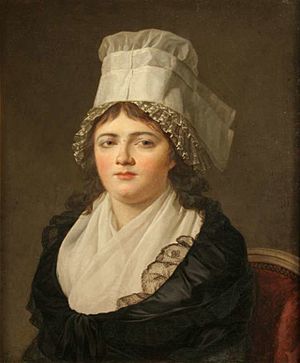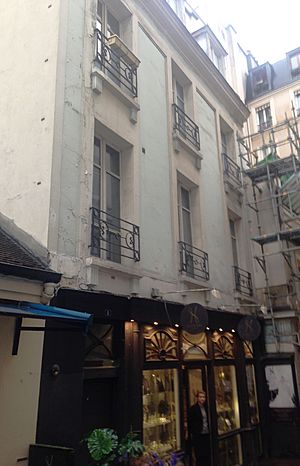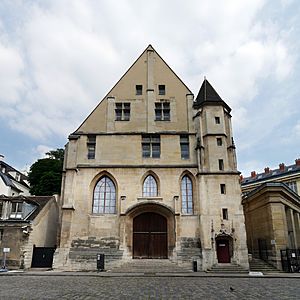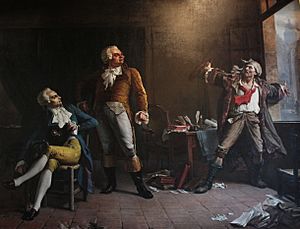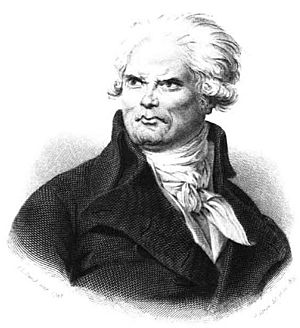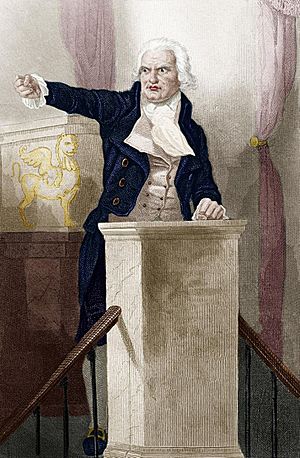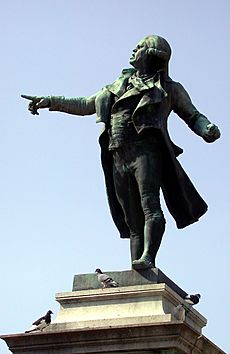Georges Danton facts for kids
Quick facts for kids
Georges Danton
|
|
|---|---|
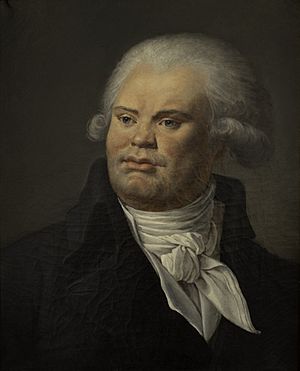
Georges-Jacques Danton. Musée Carnavalet, Paris
|
|
| Member of the Committee of Public Safety | |
| In office 6 April 1793 – 10 July 1793 |
|
| Preceded by | Office created |
| Minister of Justice | |
| In office 10 August 1792 – 9 October 1792 |
|
| Preceded by | Étienne Dejoly |
| Succeeded by | Dominique Joseph Garat |
| 23rd President of the National Convention | |
| In office 25 July 1793 – 8 August 1793 |
|
| Preceded by | Jean Bon Saint-André |
| Succeeded by | Marie-Jean Hérault de Séchelles |
| Deputy in the National Convention | |
| In office 20 September 1792 – 5 April 1794 |
|
| Constituency | Seine |
| Personal details | |
| Born | 26 October 1759 Arcis-sur-Aube, Kingdom of France |
| Died | 5 April 1794 (aged 34) Paris, First French Republic |
| Cause of death | Execution by guillotine |
| Political party | The Mountain (1792–1794) |
| Other political affiliations |
Cordeliers Club (1790–1791) Jacobin Club (1791–1794) |
| Spouses |
Antoinette Gabrielle Charpentier
(m. 1787; Louise Sébastienne Gély
(m. 1793) |
| Children | 3 |
| Parents | Jacques Danton Mary Camus |
| Occupation | Lawyer, politician |
| Signature | |
Georges Jacques Danton (born October 26, 1759 – died April 5, 1794) was an important leader during the early years of the French Revolution. He was known for his powerful speeches. Danton played a big part in ending the French monarchy (rule by kings and queens). He also helped create the First French Republic, which was a government run by elected officials.
Later, during a very violent time called the Reign of Terror, Danton wanted things to calm down. This led to his arrest and execution by guillotine in 1794.
Contents
Georges Danton's Early Life
Georges Danton was born in Arcis-sur-Aube, a town in northeastern France. His father, Jacques Danton, was a lawyer, but not very rich. His mother was Mary Camus.
Danton went to school in Sézanne. When he was thirteen, he left home to study at a seminary in Troyes.
In 1780, he moved to Paris. There, he worked as a lawyer. He also became involved in the growing movement for revolution. He joined a group called the Cordeliers Club, which was a radical political group.
Danton's Role in the French Revolution
Danton quickly became a very important leader in the French Revolution. He was a great speaker who could inspire many people. He used his words to encourage citizens to fight for their rights and a fairer society.
He helped set up the new revolutionary government. He worked to create new laws and systems to make France a better place for everyone.
Danton was also involved in creating the revolutionary tribunals. These were special courts that tried people accused of working against the revolution.
The Reign of Terror and Danton's Views
After a while, a very violent period began, known as the "Reign of Terror." During this time, many people were executed. They were seen as enemies of the revolution.
At first, Danton supported strong actions to protect the revolution. However, he later became worried about how much violence was happening. He believed that the revolution needed to calm down. He wanted France to focus on building a better future, not just punishing people.
Danton tried to change the direction of the revolution. He worked with a friend, Camille Desmoulins, on a newspaper called Le Vieux Cordelier. This newspaper asked for the Terror to end. It also suggested making peace with France's enemies.
This put Danton in a dangerous spot. Other powerful leaders, like Maximilien de Robespierre, saw Danton's ideas as a threat. They accused him of working against the revolution.
Challenges and Accusations
Near the end of the Reign of Terror, Danton faced accusations. People claimed he had used his position to gain money for himself. Many people at the time noticed that Danton seemed to have become richer during the revolution. He couldn't always explain where his money came from.
The accusations against him often lacked clear proof. However, in the Revolutionary Tribunal, strong evidence was not always needed. The jury's belief that someone was guilty was sometimes enough to lead to a quick judgment.
Arrest, Trial, and Execution
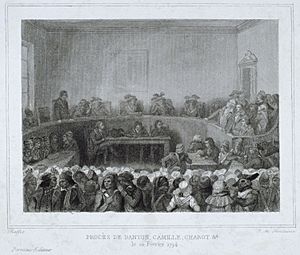
On March 30, Danton was arrested and put on trial. Even though he spoke very well during his trial, he was found guilty. He was then sentenced to death.
On April 5, 1794, Georges Danton was executed by guillotine. He was executed along with fifteen other people. This group included Marie Jean Hérault de Séchelles and Philippe Fabre d'Églantine.
Danton's Family Life
In 1784, Danton began studying law. In 1787, he became a member of the King's Council. On June 14, 1787, he married Antoinette Gabrielle Charpentier. They lived in a six-room apartment in Paris.
Georges and Antoinette had three sons:
- François, born in May 1788, who died as a baby in 1789.
- Antoine, born on June 18, 1790, who lived until 1858.
- François Georges, born on February 2, 1792, who lived until 1848.
On February 10, 1793, while Danton was away on a trip, his wife Antoinette died during childbirth. Their fourth child also died.
On July 1, 1793, Danton married Louise Sébastienne Gély. She was 16 years old. Her father was a court usher in Paris.
Fun Facts About Danton
- As a child, Danton was attacked by a bull. He was also run over by pigs. These events, along with smallpox, left scars on his face.
- When he was a student, Danton spoke out against physical punishment in class. His speech was so convincing that the school head decided to ban it.
- His very last words, spoken to the person who would execute him, were: "Show the people my head. It is well worth seeing."
Famous Words from Danton
- "After bread, education is the first need of the people."
- "Audacity, and again, audacity, and always audacity."
- "One must never compromise with tyrants."
- "Let us be terrible in order to prevent the people from being terrible themselves!"
Danton in Books and Movies
- Danton, Robespierre, and Marat are characters in Victor Hugo's novel Ninety-Three. This story is set during the French Revolution.
- Danton is a main character in the play Dantons Tod (Danton's Death) by Georg Büchner.
- The 1983 film Danton shows the disagreements between Danton and Robespierre.
- Danton also appears in the 1989 film La Révolution française.
- In the novel A Place of Greater Safety by Hilary Mantel, the revolution is seen through the eyes of Danton, Robespierre, and Desmoulins.
Images for kids
See also
 In Spanish: Georges-Jacques Danton para niños
In Spanish: Georges-Jacques Danton para niños
 | May Edward Chinn |
 | Rebecca Cole |
 | Alexa Canady |
 | Dorothy Lavinia Brown |


